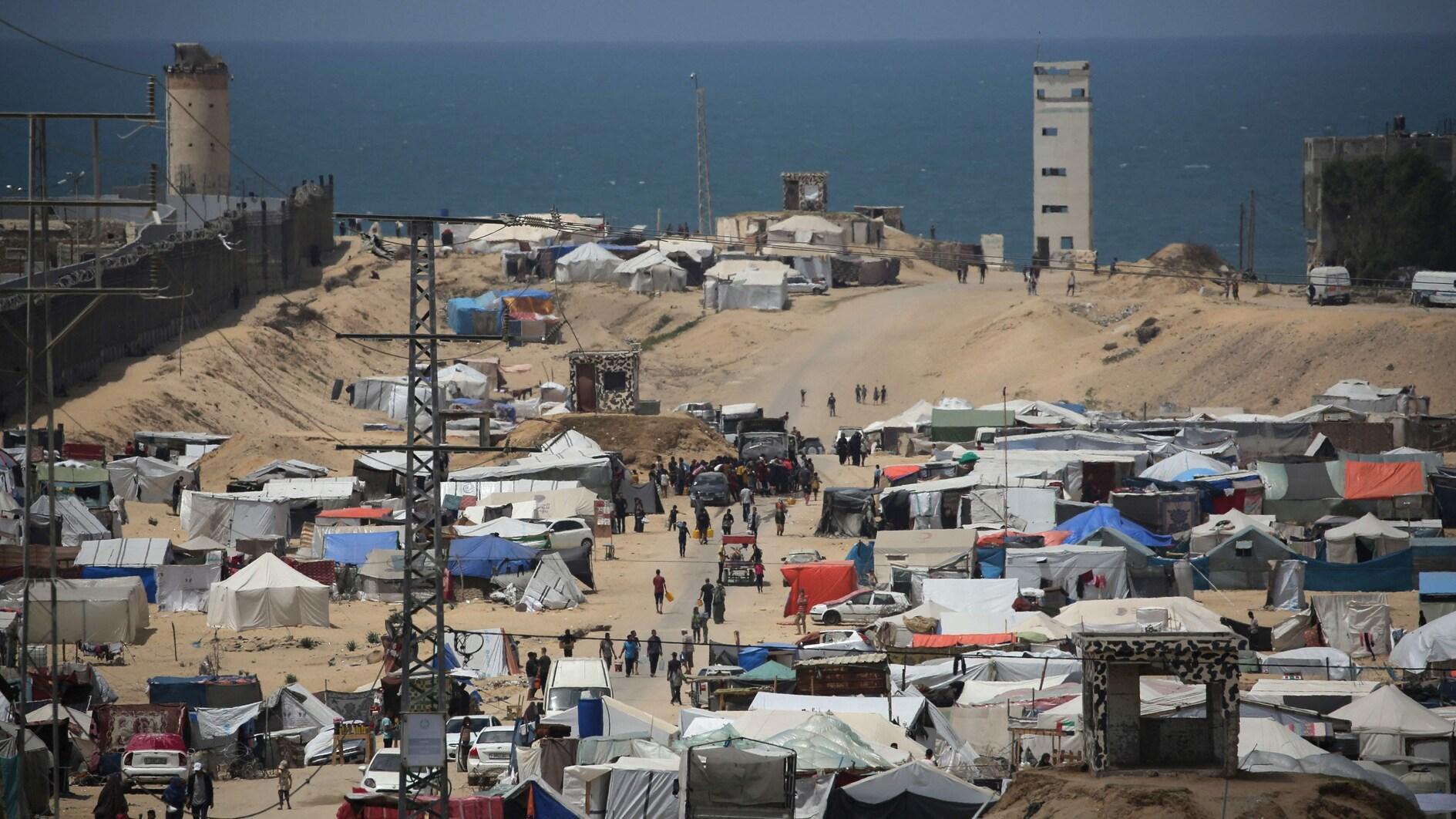US troops head to region as fears grow of Gaza war's spread
JERUSALEM

Troop reinforcements from Israel's ally the United States headed to the region on Saturday, with fears of wider war growing more than six months into Israel's assault in the Gaza Strip.
After pulling forces from the southern Gaza city of Khan Yunis one week ago, Israel's military said Saturday it was continuing to operate against militants in central Gaza.
In central Gaza's main city of Deir al-Balah, fire burned in the rubble of a destroyed mosque.
Israel's military "demanded that the whole area be evacuated" before it was "wiped out in minutes", said Abdullah Baraka, a witness.
The military said it had struck more than 30 targets across the Palestinian territory over the previous day.
Airlines said they are avoiding Iranian airspace, nearly two weeks after a strike, which Iran blamed on its arch foe Israel, destroyed Tehran's consular annex at its embassy in Damascus, Syria.
Violence involving Iran-backed groups around the Middle East, including in Lebanon, Yemen and Syria, has increased since Israeli forces began their retaliation against Hamas militants in Gaza for their Oct. 7 attack on Israel.
West Bank violence
Tensions have also flared in the Israeli-occupied West Bank, where settler attacks left at least one Palestinian dead and dozens injured, and a search continued for a missing Israeli teenager, sources from both sides said.
As talks for a Gaza truce and hostage release dragged on, the region braced for the retaliation which Iran has vowed after the consular strike whose victims included two generals.
"We are moving additional assets to the region to bolster regional deterrence efforts and increase force protection for U.S. forces," said a U.S. defence official in Washington.
The United States already has tens of thousands of troops in the Middle East and provides billions of dollars worth of military assistance to Israel.
Hamas's Oct. 7 attack resulted in the deaths of 1,170 people in Israel, mostly civilians, according to Israeli figures.
Israel's retaliatory offensive has killed at least 33,634 people in Gaza, mostly women and children, according to the Hamas-run health ministry there.
After Iran's retaliation threats, Israel said it was strengthening air defences and paused leave for combat units.
U.S. President Joe Biden sent the head of U.S. Central Command, General Michael Kurilla, to Israel for talks.
Ways to retaliate
After meeting Kurilla on Friday, Defence Minister Yoav Gallant said Israel and the United States stood "shoulder to shoulder", despite differences over the conduct of the Gaza war.
"Our enemies think that they can pull apart Israel and the United States, but the opposite is true — they are bringing us together and strengthening our ties," Gallant said.
After calls with his Australian, British and German counterparts Thursday, Foreign Minister Hossein Amir-Abdollahian said: "Iran does not seek to expand the scope of the war."
But he said it had no choice but to respond to the attack on its diplomatic mission.
There are a number of ways Iran could retaliate, and not all pose the same risk of escalation, experts said.
"What is certain is that Tehran does not want a direct war with Israel, at least at the current stage," said Eva Koulouriotis, an independent Middle East analyst.
On Saturday, the Dutch foreign ministry said its embassy in Tehran and consulate in Arbil, Iraq, would remain closed on Sunday "in connection with the rising tensions between Iran and Israel".
Citing similar reasons, Germany reiterated a warning against travel to Iran.
France earlier warned its nationals against travelling to the region, after the U.S. embassy in Israel announced it was restricting the movements of its diplomats over security fears.
German airline Lufthansa said its planes would no longer use Iranian airspace, and extended a suspension of flights to and from Tehran.
Its subsidiary Austrian Airlines made a similar move. Australian airline Qantas said its long-haul Perth-London flights would avoid Iranian airspace.
A potential widening of the Gaza conflict helped send Wall Street stocks lower on Friday. Oil and gold shot up.
In their October attack, Hamas militants seized about 250 hostages, 129 of whom Israel says remain in Gaza, including 34 the Israeli army says are dead.
Israeli Prime Minister Benjamin Netanyahu, who leads a coalition including religious and ultra-nationalist parties, is under pressure from anti-government protesters and relatives of the hostages demanding that the government get them home.
On Friday, supporters of the captives again rallied in Tel Aviv. "Hostage deal now," said one of their signs.
The European Union on Friday imposed sanctions on the armed wings of Hamas and Islamic Jihad, another militant group, for "widespread" sexual violence during the Oct. 7 attack.
Sirens in Sderot
Sirens had sounded in Sderot, just outside Gaza's northern tip, before Israeli air defences intercepted rockets fired from the territory on Friday, the military said.
It added that an air strike killed several armed militants in northern Gaza's Beit Hanoun.
Washington has ramped up pressure on Netanyahu to increase aid flows to Gaza where the United Nations warns of imminent famine.
Israel's military said an undisclosed number of aid trucks had been allowed to enter Gaza Thursday through a newly opened border crossing.
Despite repeated AFP requests for comment, Israeli authorities did not disclose the exact location of the new crossing.
Gallant had announced the new crossing on Wednesday, promising to "flood Gaza with aid", but on Thursday the U.N. Security Council said "more should be done".
In the West Bank, where more than 460 Palestinians have been killed by Israeli troops or settlers since Oct. 7, gunshots rang out and black smoke poured skywards from burning vehicles and buildings in the Palestinian village of Al-Mughayyir.
Violence erupted on Friday afternoon when Jewish settlers who were part of a manhunt for missing 14-year-old Israeli Benjamin Achimeir raided Al-Mughayyir, an AFP reporter said.
















